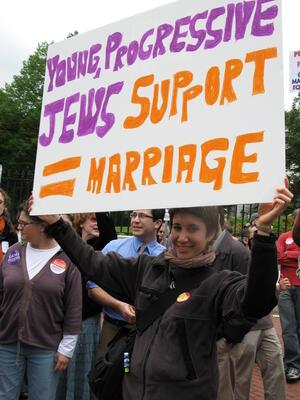Civil Rights and Social Justice Today
Consider what contemporary civil rights and social justice issues matter to us today, and how Jews and African Americans determine their priorities and responsibilities to effect social change.
Overview
Enduring Understandings
- Although the issues have changed, civil rights and social justice issues remain relevant in our world today.
- One's ethnic, racial, and/or religious backgrounds may affect one's response to civil rights and social justice issues; however, people of the same background do not necessarily all have the same response.
Essential Questions
- What are contemporary civil rights and social justice issues?
- As a consequence of their histories of oppression, do Jews and African Americans have a greater responsibility to stand up for social justice and civil rights issues?
- What are your priorities and responsibilities?
Materials Required
- Computer with speakers and an internet connection
- "Congressman, Civil Rights Icon John Lewis" podcast (audio) clips, 1:19-3:43 and 22:02-25:06.
- Document Study: Same-sex Marriage & the African American Community
OPTIONAL:
- Document Study: "Not Only for Ourselves": What are the Goals of Service Projects? published in The Forward
- Board, chart paper, or butcher paper to document responses and gather ideas
Notes to Teacher
This lesson plan covers two (related) topics and lends itself to being taught over two separate sessions. The first portion of the lesson asks students to name today’s civil rights and social justice issues and then explores whether same-sex marriage should be considered a civil rights issue. The second “Optional” section of the lesson asks students to think about service projects in a more complicated way and invites the group/class to come up with a service or social justice project idea. Please note that this is not a lesson on doing a service project – there are many other resources for that (see Teacher Resources). Rather, the second section of this lesson is designed to complement work on a project you already are doing, or to serve as a starting point for discussion about what kind of project to do.
Please also keep in mind that the issue of gay marriage may raise strong "pro" and "con" feelings among your students. Some may be gay or may have gay parents or family members, and for them this is not a theoretical issue but rather an issue of their own rights. Some may feel strongly that same-sex marriage is not compatible with Judaism. You may want to remind your students that this issue can be heated and personal, that you are not debating whether same-sex marriage is "good" or "bad" or acceptable in the Jewish community, and that class discussion must remain sensitive to the feelings of everyone involved.
Lastly, your students will be listening to two clips of a 2009 Fresh Air interview with Congressman John Lewis (in which he discusses same-sex marriage). Before your class/session begins, setup a computer with speakers and open the Fresh Air interview link in two different browsers (such as Firefox, Chrome, Safari, or Internet Explorer), so that you can then have two separate NPR Media Players open. Once the audio loads, prepare for playing the first clip (1:19-3:43) by pausing the audio at 1:19. Pause the second audio player at 22:02 in preparation for playing the second clip (22:02-25:06). If you are having difficulty setting up the audio, you can choose to just distribute the transcript.
Non-Zero Sum: Helping Others and Ourselves
Jacobs, Rabbi Jill. "Non-Zero Sum: Helping Others and Ourselves," The Forward. March 10, 2010.
There Shall Be No Needy by Rabbi Jill Jacobs, 2009
Jacobs, Rabbi Jill. There Shall Be No Needy: Pursuing Social Justice through Jewish Law and Tradition. Woodstock, VT: Jewish Lights Publishing, 2009. See also: Teachers Guide.
Keshet
Keshet, an organization working for the full inclusion of gay,
lesbian, bisexual, and transgender Jews in Jewish life.
Resources for Jewish Service Learning
Resources for Jewish Service Learning:
Just Action and Panim
American Jewish World Service and On One Foot (an online database of Jewish texts on social justice)
Jews for Racial and Economic Justice
The Center for Jewish Service Learning
Repair the World (includes a list of organizations doing immersive Jewish service learning)



